Moving on to Gibraltar:
Determined to cross the Straits of Gibraltar, with very little encouragement, constantly being warned about the sharks, supposedly numerous in these waters.
An English officer took Paul to the back of the Abators, this building is on the water, so he could see the large blue sharks waiting on the offal, that's thrown from this slaughter house,
this was not enough to make Paul change his mind, as he continued his plans for the trip.
To paddle from Gibraltar to Ceuta, which is almost straight across the straits, as the currents would not let him do this, the plan was changed to Tarifa, the lowest land in Europe. From this point he should be able to strike the African coast. The Spanish felucca, San Augustine, was chartered for the two men from Gibraltar and the captain with a crew of five sailors. Thursday, March 19th, they sailed from Gibraltar. Nearing the Spanish side, flying the American flag, when they were pulled up by a Spanish gunboat, searching the San Augustine as they were under the impression that, they were smuggling tobacco, it was extremely hard to get the officials to understand what Paul was planning to do, finally allowing them to continue the voyage.
Arriving off Tarifa at 11 pm, the captain refused to cross without clearance papers. Going into the old Moorish looking town, waking up one sleepy official after another, it was not until seven the next morning, before they could get clearance papers. Sharks were not the only danger Paul had to deal with, the wind and currents are usually variable. In the middle the current could be eastward, on each side both flood and ebb tides extend between a quarter of a mile to two miles from the shore, this can change several times a day, according to the weather and winds.
Seven thirty am, Paul was dressed and ready to set off, for the first time in all his voyages, he took the precaution of screwing sharp steel sword blades to each end of his double bladed paddle, with these he felt confident that he could stand up in the water and rip open any shark that approached him, also carrying a large dagger fastened to his wrist. Jumping into the sea amidst the enthusiastic cheering crowds that had assembled on the beach to see him start.
Paddling out to a rock close to Tarifa lighthouse, known to be the extreme southern point of Europe, which he touched, then turned and waved an “adieu” to Spain. Starting his journey, paddling southward in smooth seas with calm weather, he was in excellent spirits, a
nd fully confident of success, as he continued paddleing southward, he expected to meet the current going eastward, that would carry him towards Malabata, being directly across from Tarifa.
His calculations were off, as the current was now going in the opposite direction, westward as it gradually took him west.
Shortly after eight o’clock in the morning, Paul singing as he paddled along and came very close to running into a school of porpoises, a couple of shots were fired into them from the felucca, scaring them off, it’s believed that sharks follow them. A few moments later another school appeared, again shots were fired, this time it was successful. Realizing the current was taking him too far west, he turned his course due south, with the rising winds, he attached a small square sail to his boot, this did not improve his performance as he had hoped. After passing over Cabezes Shoals, the wind began picking up, he was still being carried westward, now nine thirty in the morning, Paul hauled up for a quick breakfast of bread and cheese. Paddling along, he once again became creative, by tieing a white square handkerchief, to an eighteen foot cord from his belt , allowing the handkerchief to drift astern, this was another precaution against sharks, as it’s known, their malevolent impulses are more likely to be excited, as they attack white objects. The idea was that a shark attacking the handkerchief, would jerk the cord, that would then warn him of it’s presence, giving Paul time to prepare for the attack.
The wind increasing from the east, Paul again tried the sail, but found it ineffectual, still steering south towards Malabata Point, about nine miles from Tarifa, though paddl
ing all this time he was not tired. The westward current continued, the risk of being carried into the Atlantic became greater. He again turned his course southeast and fought to maintain it, as the British steamer Glenarn, eastward bound, passed him with loud cheers from the people on her deck.
Two thirty in the afternoon, a strong wind, with a rapid eastward current, caused a high sea, causing Boyton to have difficulty keeping close to the boat, as his distance increased every moment, until he disappeared from her sight. The captain’s concerns grew, ordering the sailors to pull harder, about twenty minutes later he was sighted more than a half a mile ahead, as the sail was hoisted on the felucca they were able to close the gap,
which was done with a lot of effort by the anxious crew. The captain and crew of the boat, advised him to give up the attempt to cross, with their extensive experience of the straits, it is impossible, under the current conditions to complete the crossing. Boyton positively refused to give up the undertaking as he forged on ahead undeterred and in positive spirits, as the felucca soon discovered, it was impossible to keep up with him, with oars only. The boats sails were reefed and hoisted as the steering was close hauled, they were still barely able to keep him in sight.
Three o’clock in the afternoon, Paul was half way across, keeping south south east, as the wind continued to increase, as did the danger of him being carried into the ocean. With the waves constantly breaking over him, and the salt encrusting on his eyebrows, his skin smarted from the irritation. It was almost five o’clock and he was just off Boassa Point, bearing south, with only about three and a half miles from the African coast. Making another attempt to use the sail, but the wind was too strong and he had to give it up.
It began to grow darker as the wind increased with fears of a gale building up, the boisterous sea and wind in conjunction with rapid currents and heavy waves, caused the boat to loose sight of Paul. After cruising around in all directions and yelling at the top of their voices, the captain, crew and his friends were relieved to hear his distant response. Finally catching up with him, the crew became adamant in their language, as they insisted he give it up, and come on board as they were all drifting into the Atlantic ocean.
Boyton however was firm and determined to keep going, until he reached the African coast, seeing no other way to stop him, three of the crew, leaned over the boat’s side and tried to drag him on board forcefully, this attempt annoyed Paul, as he stood up in the water glaring at them and threatened to attack any man with the sword blade who dareed to touch him again. The men took to their oars as Paul started singing, with the intention of calming down the situation as he paddled away. Seven thirty, the felucca St. Augustine again lost sight of Paul, the current with the heavy waves, constantly caused him to go under as it washed over him, the boats crew, were having a rough time riding over the huge waves, as they again searched for any sight of Paul. The current now going eastward to La Ballesta, he was again sighted after a lapse of twenty minutes, the increasing darkness and bad weather, was causing a lot of hard work for those on the boat, keeping up with him.
Continued Page 181 of the book.


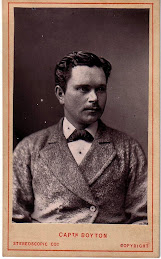

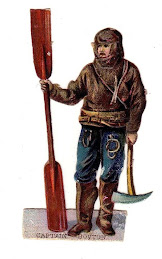

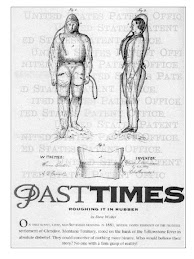
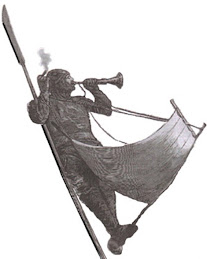

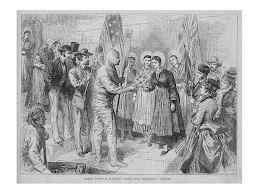

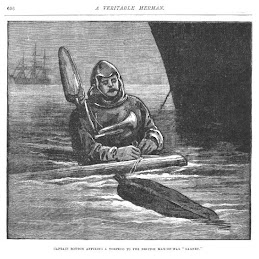
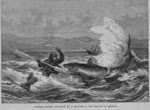
No comments:
Post a Comment